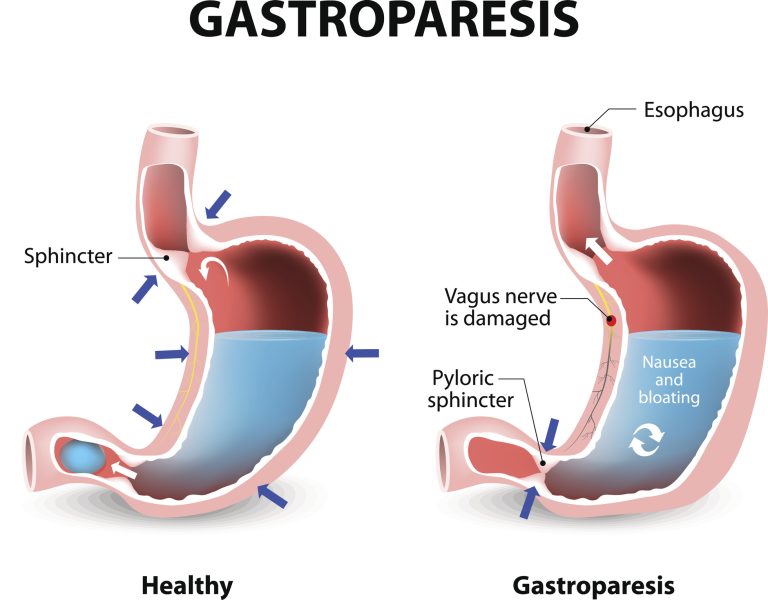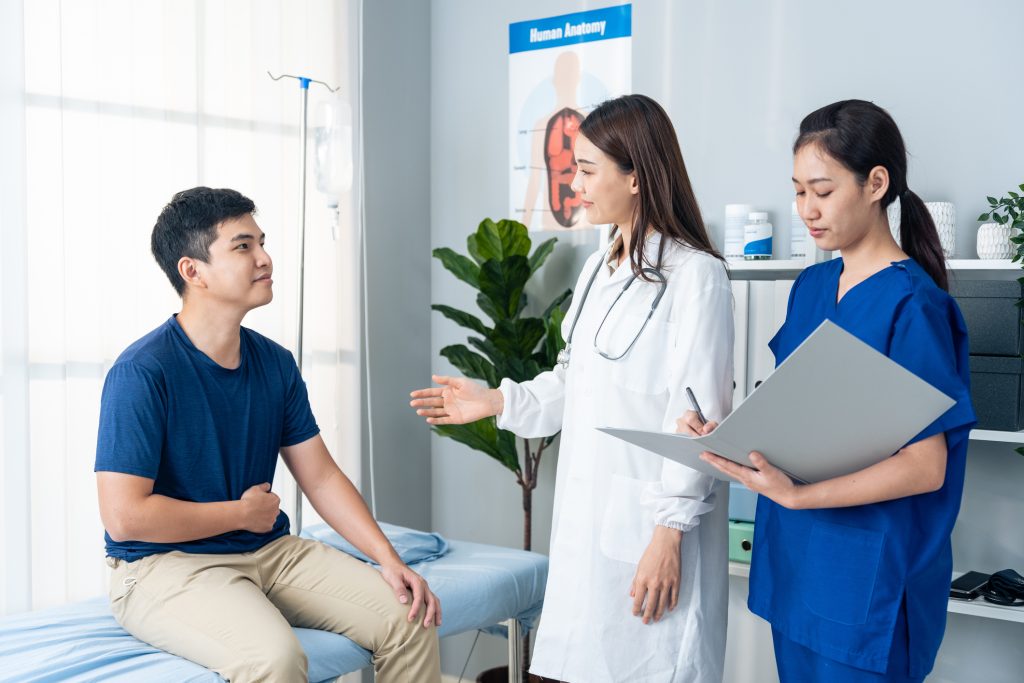早期检测,更好的消化:早期胃轻瘫筛查的好处
胃轻瘫,也称为胃排空延迟,是一种影响胃部将其内容物排入小肠的能力的状况。当负责将食物通过消化道的胃肌肉受损或减弱时,就会发生这种情况。这种肌肉功能障碍的主要原因是神经损伤,特别是迷走神经,它在调节胃收缩和协调胃排空方面起着至关重要的作用。这种神经损伤可能会破坏大脑和胃之间的正常信号传递,导致胃排空延迟和与胃轻瘫相关的症状。

内容大纲
什么导致胃轻瘫?
糖尿病是胃轻瘫的常见原因,因为长期暴露于高血糖水平可能会损伤迷走神经。其他潜在原因包括手术损伤迷走神经、病毒感染以及影响胃动力的药物。一类新的用于糖尿病患者和肥胖患者的减重药物,GLP-1激动剂也与胃排空延迟有关。一些胃轻瘫病例没有明确的原因。
本文探讨了如何识别胃轻瘫症状,并通过健康筛查方法和诊断测试的结合获得诊断。
识别胃轻瘫症状
早期识别症状对及时诊断和有效管理至关重要。以下是一些关键症状:
- 恶心和呕吐:
持续的恶心是常见症状,尤其是在饭后,经常涉及前几餐未消化的食物。 - 早饱感:
患有胃轻瘫的人在吃了少量食物后会感到饱腹,这可能导致营养不足和意外体重减轻。 - 腹痛和腹胀:
腹部饱胀或膨胀感是常见的,引起不适和过度饱腹感。 - 胃酸逆流:
食物在胃中停留时间超过正常时,可能出现胃灼热或胃食管反流病(GERD)的症状。 - 血糖波动:
在糖尿病患者中,不可预测的胃排空可能导致血糖水平波动,使糖尿病管理复杂化。 - 食欲减退:
由于不适和饱腹感,减少进食欲望是常见的,可能导致营养不足。

早期检测胃轻瘫的重要性
主要关注之一是营养不良,因为胃排空延迟会阻止身体吸收必要营养,导致体重减轻和缺乏可能削弱整体健康。这种情况还可能加重潜在疾病,如糖尿病,使血糖管理更具挑战性,增加并发症的风险。此外,与胃轻瘫相关的持续呕吐等症状可能导致脱水和电解质失衡,如果不及时处理,可能危及生命。
及早识别和管理胃轻瘫至关重要,以预防严重后果。此外,早期检测可以带来以下好处;
|
立志实现健康目标?Healthway Screening Centres |
当出现这些症状时该怎么办?
就诊家庭医生(GP)在最初的健康筛查过程中发挥着至关重要的作用,通过识别症状、进行初步测试,并在必要时转诊患者给专科医生。筛查胃轻瘫的初始步骤包括全面评估患者的症状、病史和体格检查,然后进行特定的诊断测试。

- 回顾症状
医生会询问患者的症状,包括恶心、呕吐、腹胀和腹痛的频率和严重程度。了解这些症状对日常生活的影响对诊断至关重要。 - 评估病史
医生会询问患者是否有潜在的健康状况,如糖尿病和神经系统疾病,这些可能导致胃轻瘫。他们还会审查当前药物和可能影响胃动力的过去手术。 - 进行体格检查:
体格检查有助于识别脱水、营养不良和腹部异常的体征,这些可以提供胃轻瘫存在的线索。
患有胃轻瘫的个体通常在疾病晚期才出现。在最终诊断之前,通常被误诊为简单的胃炎。这导致及时治疗的延迟。早期检测使患者和医疗保健提供者能够在并发症出现之前解决胃轻瘫带来的挑战。
如果您有任何症状,
请咨询我们友好的家庭医生在任何Healthway Medical Clinics点击这里访问我们的诊所
胃轻瘫的诊断测试
一旦完成初始健康筛查,医生会使用特定的诊断测试来评估和确认胃轻瘫的诊断。您的医生可能推荐的一些诊断测试包括:
1. 胃镜检查
胃镜检查,也称为上消化道(GI)内窥镜检查,是一种允许医生检查上消化道(食道、胃和小肠的第一部分)内膜的程序。这个程序使用一根细长、灵活的管子,称为内窥镜,其末端连接有一个微型摄像头和灯光。该程序对排除消化症状的潜在原因,如梗阻,具有不可估量的价值。它检测消化道内膜的变化,可以早期发现溃疡等疾病和早期胃癌。
2. 胃排空显像术
患者摄入一种特殊的餐食,可以被扫描机器可视化。扫描仪跟踪胃部在几个小时内排空食物的速度。胃排空延迟(食物在胃中停留时间过长)将确认胃轻瘫的诊断。
3. 腹部影像扫描(CT或MRI扫描)
腹部CT或MRI扫描可让医生评估症状(恶心、呕吐、体重减轻、食欲减退、腹痛)的替代原因。相同的症状也可能暗示消化道癌症,例如胃、肝脏、胰腺、小肠或结肠癌。
总之,胃轻瘫是一种需要及时识别和干预以预防营养不良和脱水等并发症的状况。早期筛查和诊断至关重要,因为它们使医疗保健提供者能够实施适当的管理策略。通过病史评估、体格检查和先进的诊断测试,医疗保健专业人员可以准确诊断胃轻瘫,并根据个体需求制定治疗计划。
寻求消化问题的专家建议?
我们的胃肠病专家在Nobel Gastroenterology Centre提供全面服务,包括会诊和胃镜等诊断测试。访问Nobel Gastroenterology Centre与Nobel的胃肠病专家安排会诊。Nobel Gastroenterology Centre




